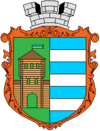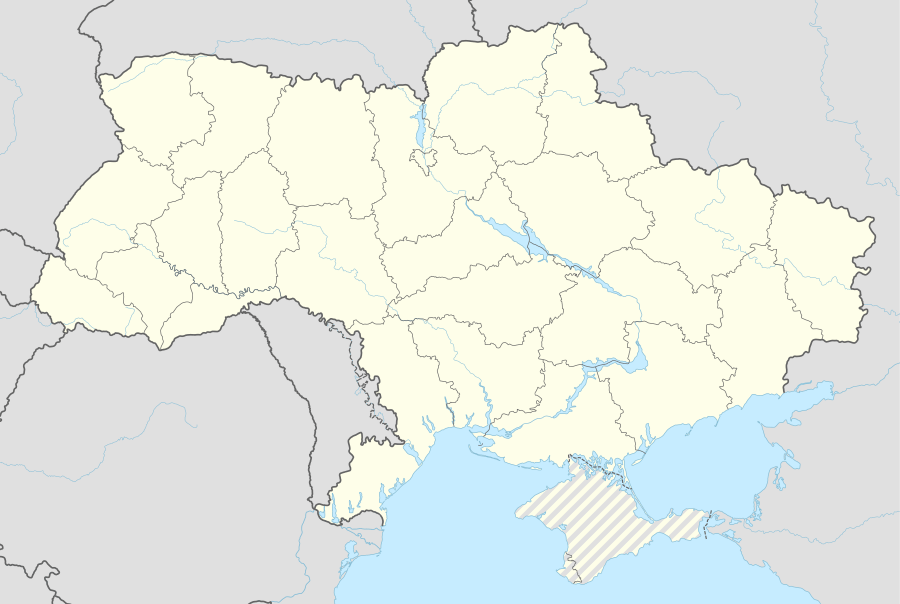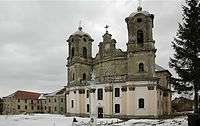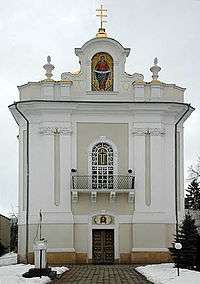Horodenka
Horodenka (Ukrainian: Городе́нка, Polish: Horodenka, occasionally Horodence, Yiddish: האראדענקע Horodenke) is a city located in Ivano-Frankivsk Oblast, in Western Ukraine. It is the administrative center of Horodenka Raion (district). Population: 9,315 (2016 est.)[1]. In 2001 the population was around 9,800.
Horodenka Городенка | |
|---|---|
City | |
 Seal | |
 Horodenka Location of Horodenka within Ukraine | |
| Coordinates: 48°40′3″N 25°30′1″E | |
| Country | |
| Oblast (province) | Ivano-Frankivsk |
| Raion (district) | Horodenka Raion |
| Population (2016) | |
| • Total | 9,315 |
History

The first mention of Horodenka was in 1195, when it was described as a village in the Kingdom of Galicia–Volhynia inhabited by farmers and craftsmen.[2] It was later part of the Polish–Lithuanian Commonwealth until 1772.[3] The 17th century saw a significant influx of Armenian immigrants to Horodenka. In 1706, a large Armenian Catholic church was erected in the town.[4] In 1668 it became one of the Polish towns to be chartered under Magdeburg rights, through the use of a privilege known as "settlement with German law”.[5]

From the first partition of Poland in 1772 until 1918, the town was part of the Austrian monarchy (Austria side after the compromise of 1867), head of the district with the same name, one of the 78 Bezirkshauptmannschaften in Austrian Galicia province (Crown land) in 1900.[6] The fate of this province was then disputed between Poland and Ukraine, until the Peace of Riga in 1921.
In the period of the Second Polish Republic, it was a district capital within the Stanisławów Voivodeship.[7]
During World War II the Jewish population of Horodenka, comprising about half of the town's population, were shot and killed in a mass grave by the Nazis.[8] About a dozen Jews survived and formed a partisan combat unit which fought against the Nazis and hid in the forests.[9] There is a synagogue in Salford, England named in honour of this community.
Famous people from Horodenka
- Ben Bonus, Yiddish theater actor and singer
- Nicholas Charnetsky (1884-1959), Ukrainian Catholic bishop and martyr.
- Kasper Cieglewicz, Polish poet and independence activist.
- Yuliya Dumanska, handball goalkeeper who plays for the Romanian national team since 2016.[10]
- Jakob Edelstein, Elder of the Jews in Theresienstadt.
- Alfred Fiderkiewicz, political activist, mayor of Krakow, deputy to the Sejm in the interwar period.
- Salo Flohr, chess grandmaster.
- Alexander Granach (Jessaja Szajko Gronish), leading stage and film actor in Weimar Germany, died at 52 while establishing himself in Hollywood and on Broadway. Author of autobiography, There Goes an Actor [new edition: From the Shtetl to the Stage: the Odyssey of a Wandering Actor].
- Seweryn Hammer, Polish scholar, professor of several universities.
- Elias Jubal (born as Benno Neumann 12.1.1901), theatre director and founder of the Kellertheater "Theater für 49" in Vienna.
- Dr. Wladimir Sylvester Kindraczuk (1882-1969), discoverer of Bacillus carpathicus in huslanka.
- Marie Ljalková, sniper in the Soviet army.
- Leonard Lyons, U.S. newspaper columnist.
- Rabbi Nachman of Horodenka, a disciple of the Baal Shem Tov and grandfather of Rebbe Nachman of Breslov.
- Maurie Orodenker, U.S. music critic with an Americanized version of the surname "Horodenka".
- Mieczyslaw Romanowski, Polish poet.
- Jan Stebnowski, Polish painter and publicist.
- Aleksander Topolski, soldier, architect, and writer, author of "Without Vodka".
- Dmytro Zipchen, Canadian politician.
- Oleksander Belo
References
- "Чисельність наявного населення України (Actual population of Ukraine)" (PDF) (in Ukrainian). State Statistics Service of Ukraine. Retrieved 19 July 2016.
- "Local history | Virtual Shtetl". sztetl.org.pl. Retrieved 2018-12-06.
- "Horodenka | יהדות גליציה ובוקובינה". jgaliciabukovina.net. Retrieved 2018-12-06.
- "Armenian church in Horodenka - Horodenka - UA-travel.info". ua-travel.info. Retrieved 2018-12-06.
- Munzinger, Mark R. (2011). "The Text and Textualization of Codex BJ 168: Legal Culture in Transition at the High Court of Magdeburg Law at the Castle of Kraków". Krakowskie Studia z Historii Państwa i Prawa. 4: 21–41.
- Die postalischen Abstempelungen auf den österreichischen Postwertzeichen-Ausgaben 1867, 1883 und 1890, Wilhelm KLEIN, 1967
- "Stanisławowskie". kresy.info.pl. Retrieved 2018-12-06.
- Pohl, Dieter (1998). "Hans Krueger and the Murder of the Jews in the Stanislawow Region (Galicia)" (PDF). Yad Vashem Studies. 26: 239–264.
- "Gorodenka, Ukraine (English pages V - VII)". www.jewishgen.org. Retrieved 2018-12-06.
- "Ce debut! În premieră la un European, Iulia Dumanska a contribuit din plin la victoria României cu Germania". GSP (in Romanian). Retrieved 2018-12-06.
External links
- Horodenka in the Encyclopedia of Ukraine
- Horodenka in the JewishGen ShtetLinks project
- The Book of Horodenka
- Photographs of Jewish sites in Horodenka in the Jewish History in Galicia and Bukovina
- The Jewish Community of Gorodenka, The Museum of the Jewish People at Beit Hatfutsot
- Tour in Horodenka
- Horodenka, Ukraine at JewishGen